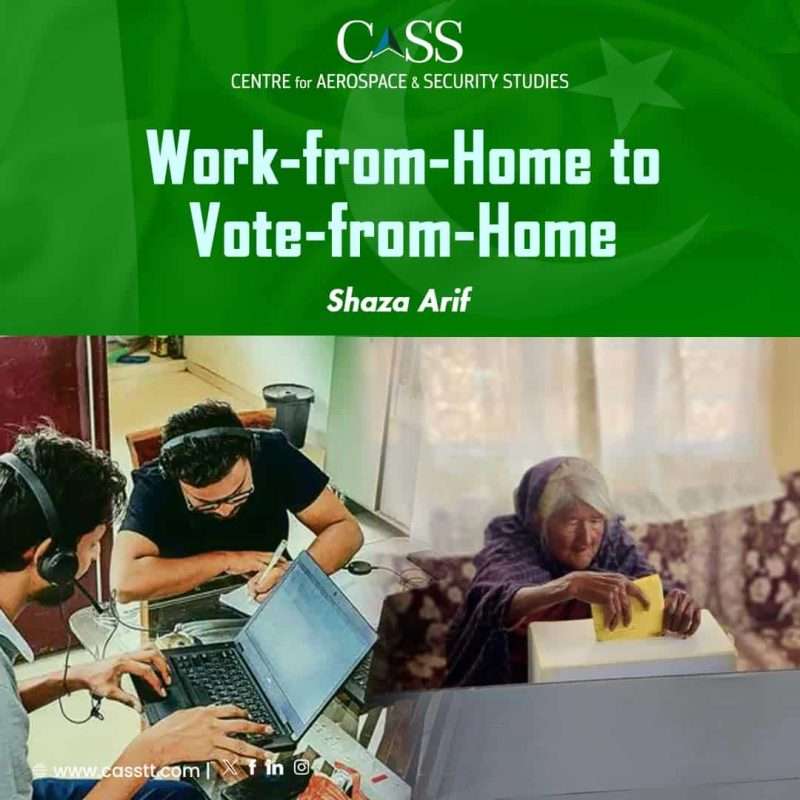The COVID-19 pandemic left behind many enduring legacies, with remote work, commonly known as Work-From-Home (WFH) being one of its more enduring ones. Back then, workplaces witnessed a remarkable revamp in routines, schedules and practices. Weekly office meetings shifted from conference rooms to living rooms via virtual meeting apps. Home desks assumed the role of office cabins, complete with the added benefit of flexible working hours in many instances. This new paradigm of work demonstrated a largely positive impact in different sectors with increased productivity, better work-life balance, and environment-friendly results – a reason that has led to the continuation of the trend even after the pandemic. Now, it’s time to analyse how to effectively increase adoption of this innovative mode to crucial domains – such as education, finance, media, marketing, customer service and political processes etc.
In the realm of political processes, electoral procedures vis-à-vis remote voting requires attention given its cornerstone role in democratic values. While WFH has demonstrated its success and adaptability, the true potential of Vote-From-Home (VFH) remains to be seen.
In the regional context, 2024 marks an important election year in South Asia as polls were held in Pakistan and are scheduled shortly in India. While many citizens desire to use their political rights and cast their vote, many need help to perform their civic responsibility due to impeding factors such as age, health conditions, and proximity to polling stations, amongst other factors. With regards to Pakistan, the state already maintains a postal ballot system for government officials, armed force personnel and their families along with differently-abled voters to exercise their voting right. Likewise, recently, the Indian Election Commission for the first time announced its VFH services for senior citizens above 85 years of age and people with 40 percent disabilities to facilitate 85 lakh senior citizens and 88.4 lakh differently-abled voters. The Indian Election Commission primarily uses electronic voting for general elections. However, it will rely on the traditional postal ballot for the VFH category votes along with a lengthy manual process beforehand – a practice that already exists in several countries, including Pakistan.
While these approaches may help thousands of voters to cast their votes from the comfort of their homes, exploring other innovative options, mainly via E-voting, is also necessary in South Asia. Online voting platforms, such as encrypted mobile applications, could be employed to improve existing voting procedures. Such apps can be further strengthened and secured via use of blockchain technology for electoral voting across the world. Using such technology in the election process can combat voter fraud, increase participation, reduce associated costs, increase process transparency, and lead to timely results. Indeed, these are some of the issues that have always been a source of concern, particularly voter turnout. In Pakistan, voter turnout this year was only 48 percent, suggesting that approximately half of the voters were unable to vote.
Over time, these technologies could extend beyond aiding those facing inconveniences, potentially becoming widespread tools for the majority of the population during elections. To be fair, several administrative, technical, and logistical challenges may be encountered in integrating this technology particularly in the rural areas, yet the potential benefits are plentiful to embark on this digital transformation.
Such transformative shifts are not merely about convenience; they manifest progress, innovation and adaptability that could be introduced in society. They underscore the role of technology that could be used not only for incremental improvements but also to streamline critical affairs. While emerging technologies are being applied across a host of other sectors, it is important to utilise them optimally for collective good. Hence, such technologies and methods should also be promoted to improve the efficiency of the voting process and enhance citizen participation across the board.
As they say, change is the only constant. It is the need of the technologically-advanced era that innovative options are explored, letting go of traditional methods, outdated for the current time. It is crucial to remember that every voice must be heard in order for democratic processes to thrive. In a similar fashion in which organisations thrived as individuals contributed miles away from their workplaces, it is possible that the introduction of a new mode of voting could make the process much more smooth and transparent while ensuring that it is inclusive and accessible. Hence, governments worldwide and in Pakistan should embrace the technological momentum and be more forthcoming to implement a similar shift in their democratic process. Despite the electoral outcome, it is imperative to make the process more convenient and effective for all, augmenting the very foundations of democracy.
Shaza Arif is a Research Associate at the Centre for Aerospace & Security Studies (CASS), Islamabad, Pakistan. The article was first published in Modern Diplomacy. She can be reached at [email protected].





